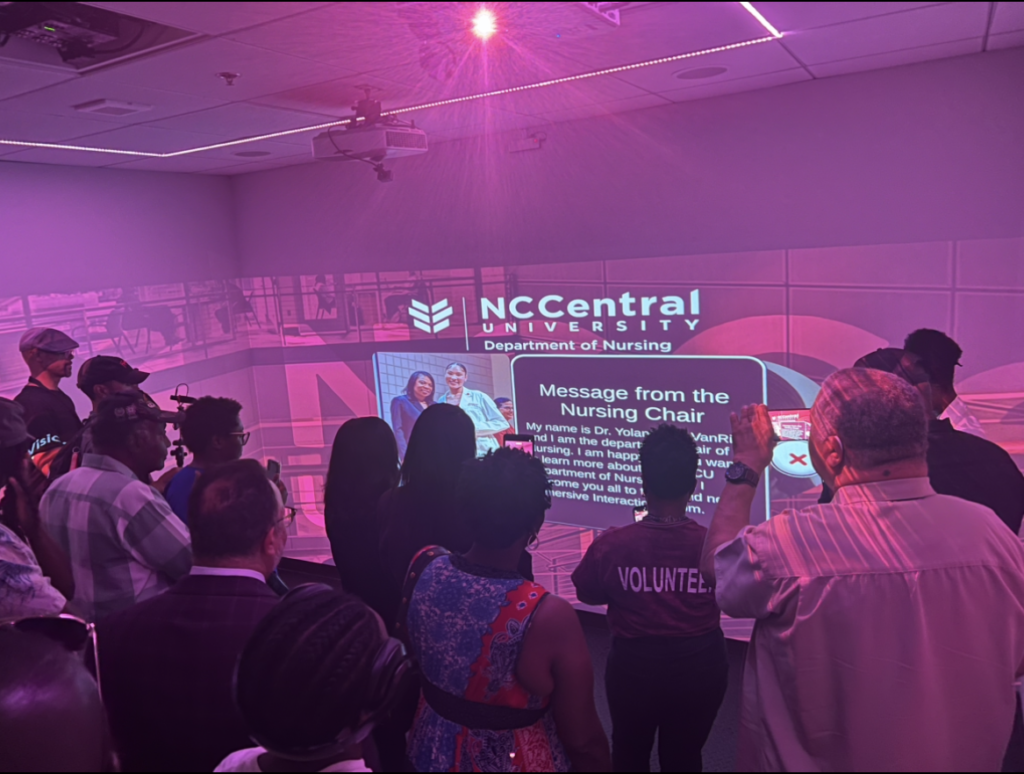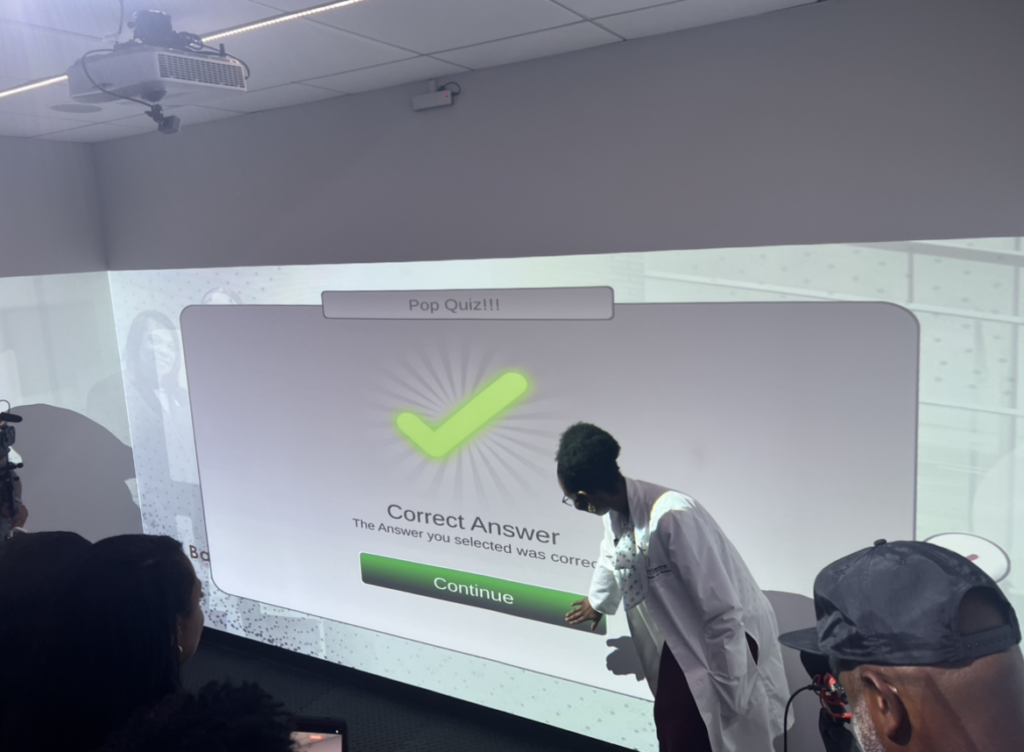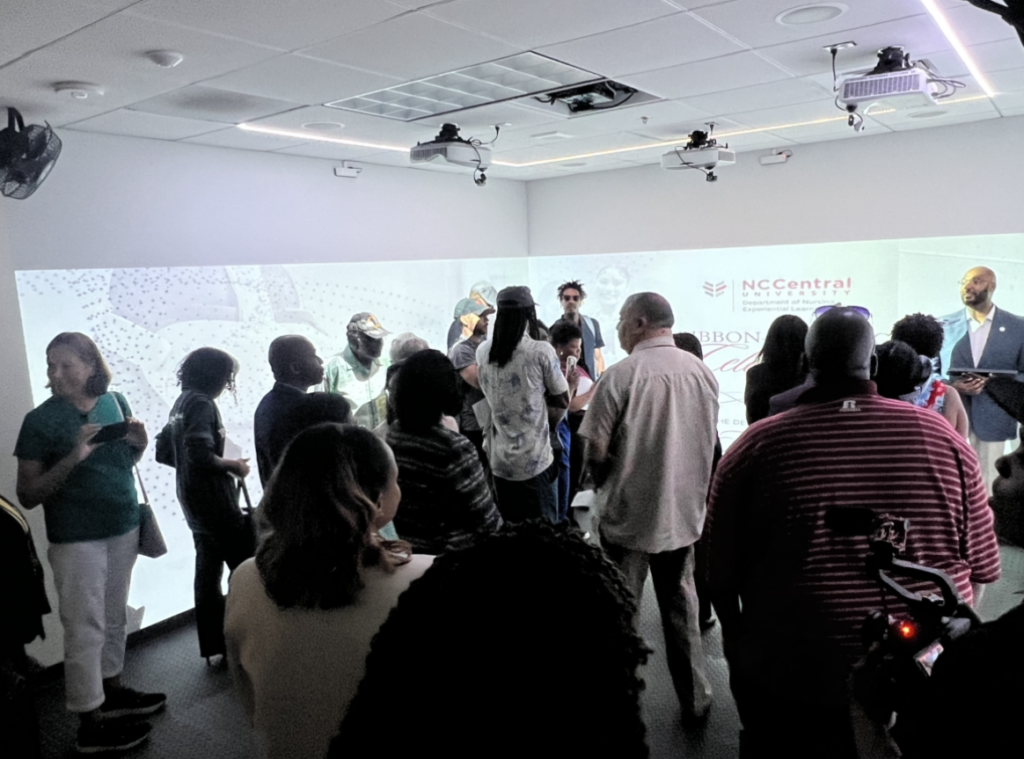By Jordan Meadows
Staff Writer
North Carolina Central University’s Department of Nursing broke new ground in health education last Thursday, becoming the first university in North Carolina to implement an immersive interactive training room designed to revolutionize how nursing students train for real-world clinical situations.
Located on the second floor of the nursing building, the new immersive room transports students into high-stakes medical scenarios, including everything from post-operative complications to rural health simulations and mental health challenges. Using ceiling-mounted projectors, the room surrounds students with visuals on three walls, complemented by sensory features such as scent diffusers and fans to simulate environmental conditions.
“There are scent diffusers in there and fans on the ceiling that will pipe in smoke, burning rubber and smells from the environment,” said Dr. Tina Scott, Director of Experiential Learning at NCCU.
Whether it’s responding to a fiery 14-car pile-up or triaging patients in a virtual hospital, the immersive technology provides hands-on experiences far beyond the classroom.
“Students are immersed in a virtual hospital,” Scott said. “They can see a virtual patient in a bed. It’s a replica of a hospital setting. It has monitors, a sink. They can also see other nurses. They can see the patient’s chart and look up other assessments.”
And the experience doesn’t stop at visuals and smells—students can interact with virtual patients in real time, practicing therapeutic communication and making clinical decisions under pressure. After each simulation, instructors debrief with students, reviewing their actions to reinforce learning.
“That right there is an experience—or at least an opportunity to have one. They learn how to treat patients,” said Dr. Mohammad Ahmed, Dean of the College of Health and Sciences. “It's great to have this, because that's what training nurses is all about: giving them real-world experiences they can learn from once they're out in the field.”
The department has access to more than 2,000 training scenarios and now, thanks to new 360-degree camera technology, can also create custom simulations specific to local communities.
The ribbon-cutting ceremony for the immersive room was led by Dr. Yolanda Vanriel, Chair of the Department of Nursing. In her opening remarks, she expressed gratitude to the department and university leadership, noting the room’s distinction as the first of its kind in the state.
“Patience is a virtue, and good things do come to those who wait. We are here where purpose tastes light,” Vanriel said.
Following the ceremony, attendees were invited to experience the immersive environment for themselves.
Dr. Ahmed guided the interactive portion, demonstrating how each wall responds to touch and movement, with scenarios ranging from hospital settings to street-side emergencies—even international locales like the beaches of Cancun or the streets of Paris. These simulations allow students to gain critical experience responding to medical crises in both clinical and public environments.
The immersive room is just one part of a broader expansion within NCCU’s nursing program. In summer 2024, the department introduced virtual reality (VR) technology using oculus headsets and hand controllers to further enhance simulation training. The program, called vrClinicals for Nursing, uses conversational AI to simulate real patient interactions.
“They were able to take care of four patients, and once they put the headsets on, they actually were inside of a hospital setting, they had to prioritize which patients they wanted to see first, and they had to also develop their plan of care,” Scott explained. She noted that the experience significantly boosted students' confidence. Now, all students in clinical-focused courses go through the program.
Guests at the event also toured NCCU’s in-house teaching hospital, the Clinical Learning Resource Center (CLRC), also known as Eagle General Hospital. This state-of-the-art simulation facility supports skill-building across the entire nursing curriculum—from fundamental skills to advanced adult health, pediatrics, maternity, and mental health. The CLRC includes 14 high-fidelity mannequins and a wide range of partial task trainers, all designed to help students sharpen their clinical reasoning and psychomotor skills.
Established in 1948, the Department of Nursing at NCCU has a long legacy of innovation, beginning with its first public health nursing certificate and later launching an RN to BSN program in 1961. Today, with immersive and AI-driven technologies leading the way, the program continues to evolve—preparing tomorrow’s nurses with the tools they need to deliver safe, effective, and compassionate care.





